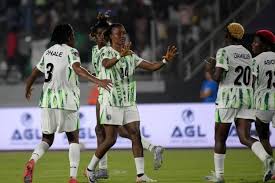Demehin Addresses VAR Controversy as CAF Sacks Refereeing Chief After WAFCON final
NEWSSPORTOTHER NEWS
8/2/20252 min read


Demehin Addresses VAR Controversy as CAF Sacks Refereeing Chief After WAFCON Final
The recently concluded Women's Africa Cup of Nations (WAFCON) final has been marred by a significant VAR controversy, leading to a formal complaint from the Royal Moroccan Football Federation (FRMF) and the subsequent dismissal of the Confederation of African Football's (CAF) Director of Refereeing, Désiré Noumandiez Doué.1
The incident in question occurred in the dying minutes of the thrilling final between hosts Morocco and Nigeria, with the score tied at 2-2. Super Falcons defender Oluwatosin Demehin was initially adjudged by Namibian referee Antsino Twanyanyukwa to have handled the ball in the box, leading to a penalty call for Morocco.2
However, a VAR review, led by Rwandan official Salima Mukansanga, prompted Twanyanyukwa to overturn her initial decision.3 Speaking for the first time on the matter, Demehin stated, "I was scared, but deep down I knew it wasn't a penalty. The ball touched my hand, yes, but the way I was positioned, it wasn't unnatural."
Moments after the overturned penalty, Nigeria's Jennifer Echegini scored a dramatic 88th-minute winner, securing a record-extending 10th WAFCON title for the Super Falcons.4
The FRMF, however, was far from pleased with the officiating, lodging a formal complaint with CAF alleging multiple errors, with the reversed penalty call being a primary point of contention.5 Moroccan head coach Jorge Vilda expressed his frustration, stating, "We can't understand the decision made by the referee. She gave a penalty, but then the images we saw weren't the same as those presented to the referee. The images were clear—we were sure she had to give a pe6nalty."
In the aftermath of the controversy, CAF has reportedly sacked its Director of Refereeing, Désiré Noumandiez Doué.7 While Doué did not directly officiate the match, his role in referee appointments placed him under scrutiny amidst the widespread criticism of officiating standards across the continent.8 His removal is seen as a direct response to the escalating pressure and a move to restore confidence in CAF's refereeing system.
The incident has reignited concerns about the quality and transparency of refereeing in African football, with several North African associations, in particular, voicing frustrations and accusing the organization of regional bias. CAF is now under immense pressure to review and reform its refereeing structures to prevent similar controversies in future tournaments.
